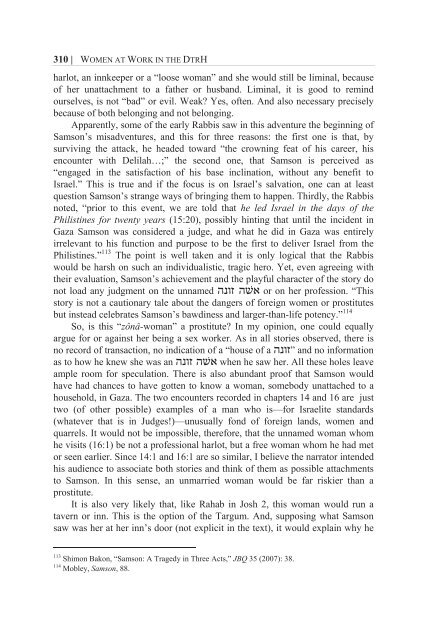Women at Work in the Deuteronomistic History - International Voices ...
Women at Work in the Deuteronomistic History - International Voices ...
Women at Work in the Deuteronomistic History - International Voices ...
You also want an ePaper? Increase the reach of your titles
YUMPU automatically turns print PDFs into web optimized ePapers that Google loves.
310 | WOMEN AT WORK IN THE DTRH<br />
harlot, an <strong>in</strong>nkeeper or a “loose woman” and she would still be lim<strong>in</strong>al, because<br />
of her un<strong>at</strong>tachment to a f<strong>at</strong>her or husband. Lim<strong>in</strong>al, it is good to rem<strong>in</strong>d<br />
ourselves, is not “bad” or evil. Weak? Yes, often. And also necessary precisely<br />
because of both belong<strong>in</strong>g and not belong<strong>in</strong>g.<br />
Apparently, some of <strong>the</strong> early Rabbis saw <strong>in</strong> this adventure <strong>the</strong> beg<strong>in</strong>n<strong>in</strong>g of<br />
Samson’s misadventures, and this for three reasons: <strong>the</strong> first one is th<strong>at</strong>, by<br />
surviv<strong>in</strong>g <strong>the</strong> <strong>at</strong>tack, he headed toward “<strong>the</strong> crown<strong>in</strong>g fe<strong>at</strong> of his career, his<br />
encounter with Delilah…;” <strong>the</strong> second one, th<strong>at</strong> Samson is perceived as<br />
“engaged <strong>in</strong> <strong>the</strong> s<strong>at</strong>isfaction of his base <strong>in</strong>cl<strong>in</strong><strong>at</strong>ion, without any benefit to<br />
Israel.” This is true and if <strong>the</strong> focus is on Israel’s salv<strong>at</strong>ion, one can <strong>at</strong> least<br />
question Samson’s strange ways of br<strong>in</strong>g<strong>in</strong>g <strong>the</strong>m to happen. Thirdly, <strong>the</strong> Rabbis<br />
noted, “prior to this event, we are told th<strong>at</strong> he led Israel <strong>in</strong> <strong>the</strong> days of <strong>the</strong><br />
Philist<strong>in</strong>es for twenty years (15:20), possibly h<strong>in</strong>t<strong>in</strong>g th<strong>at</strong> until <strong>the</strong> <strong>in</strong>cident <strong>in</strong><br />
Gaza Samson was considered a judge, and wh<strong>at</strong> he did <strong>in</strong> Gaza was entirely<br />
irrelevant to his function and purpose to be <strong>the</strong> first to deliver Israel from <strong>the</strong><br />
Philist<strong>in</strong>es.” 113 The po<strong>in</strong>t is well taken and it is only logical th<strong>at</strong> <strong>the</strong> Rabbis<br />
would be harsh on such an <strong>in</strong>dividualistic, tragic hero. Yet, even agree<strong>in</strong>g with<br />
<strong>the</strong>ir evalu<strong>at</strong>ion, Samson’s achievement and <strong>the</strong> playful character of <strong>the</strong> story do<br />
not load any judgment on <strong>the</strong> unnamed הנוז השׁא or on her profession. “This<br />
story is not a cautionary tale about <strong>the</strong> dangers of foreign women or prostitutes<br />
but <strong>in</strong>stead celebr<strong>at</strong>es Samson’s bawd<strong>in</strong>ess and larger-than-life potency.” 114<br />
So, is this “zônâ-woman” a prostitute? In my op<strong>in</strong>ion, one could equally<br />
argue for or aga<strong>in</strong>st her be<strong>in</strong>g a sex worker. As <strong>in</strong> all stories observed, <strong>the</strong>re is<br />
no record of transaction, no <strong>in</strong>dic<strong>at</strong>ion of a “house of a הנוז” and no <strong>in</strong>form<strong>at</strong>ion<br />
as to how he knew she was an הנוז השׁא when he saw her. All <strong>the</strong>se holes leave<br />
ample room for specul<strong>at</strong>ion. There is also abundant proof th<strong>at</strong> Samson would<br />
have had chances to have gotten to know a woman, somebody un<strong>at</strong>tached to a<br />
household, <strong>in</strong> Gaza. The two encounters recorded <strong>in</strong> chapters 14 and 16 are just<br />
two (of o<strong>the</strong>r possible) examples of a man who is—for Israelite standards<br />
(wh<strong>at</strong>ever th<strong>at</strong> is <strong>in</strong> Judges!)—unusually fond of foreign lands, women and<br />
quarrels. It would not be impossible, <strong>the</strong>refore, th<strong>at</strong> <strong>the</strong> unnamed woman whom<br />
he visits (16:1) be not a professional harlot, but a free woman whom he had met<br />
or seen earlier. S<strong>in</strong>ce 14:1 and 16:1 are so similar, I believe <strong>the</strong> narr<strong>at</strong>or <strong>in</strong>tended<br />
his audience to associ<strong>at</strong>e both stories and th<strong>in</strong>k of <strong>the</strong>m as possible <strong>at</strong>tachments<br />
to Samson. In this sense, an unmarried woman would be far riskier than a<br />
prostitute.<br />
It is also very likely th<strong>at</strong>, like Rahab <strong>in</strong> Josh 2, this woman would run a<br />
tavern or <strong>in</strong>n. This is <strong>the</strong> option of <strong>the</strong> Targum. And, suppos<strong>in</strong>g wh<strong>at</strong> Samson<br />
saw was her <strong>at</strong> her <strong>in</strong>n’s door (not explicit <strong>in</strong> <strong>the</strong> text), it would expla<strong>in</strong> why he<br />
113<br />
Shimon Bakon, “Samson: A Tragedy <strong>in</strong> Three Acts,” JBQ 35 (2007): 38.<br />
114<br />
Mobley, Samson, 88.




